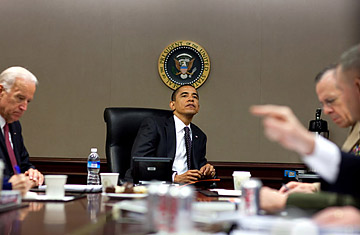
President Obama in a Situation Room briefing at the White House
As he struggles to advance U.N. sanctions against Iran for its defiant pursuit of nuclear capability, President Barack Obama is about to launch a month of high-profile international meetings designed to restrict the spread of nuclear weapons. But Iran's resistance to international pressure threatens the credibility of the entire enterprise. Rather than opening a new era of international cooperation on nuclear nonproliferation, the next four weeks of summitry look more like stagecraft designed to hide failing statecraft.
Next week Obama welcomes more than 40 heads of state to Washington for talks aimed at getting countries with existing stocks of weapons-grade uranium and plutonium to do a better job of securing them so they don't fall into the hands of terrorists. Then, in May, the parties to the Treaty on the Non-Proliferation of Nuclear Weapons (NPT) will convene in New York for the treaty-review conference held every five years. Major nuclear powers such as the U.S. and Russia hope to strengthen the floundering treaty, which seeks to prevent new countries from acquiring nuclear weapons by getting those who already have them to begin disarming.
The unspoken shadow over both meetings will be Iran's pursuit of the capability to build nuclear weapons, undeterred by Washington's attempts to stop it with a combination of talks and coercion. Iran is a signatory to the NPT, which gives it the right to enrich uranium for energy purposes. But because Iran violated NPT transparency requirements, the Security Council has punished it with a series of limited sanctions. Efforts to ratchet up the U.N. sanctions, first imposed in December 2006, have thus far come to nothing.
To say Iran has the advantage here is an understatement. Every attempt to curtail its nuclear program has failed. Obama's outreach in the first year of his Administration produced neither a change in Iran's behavior nor a willingness among other countries to increase the pressure on Tehran. The Administration currently claims it is making progress toward tougher sanctions, and the President said this week that he hoped the Security Council would pass a new sanctions resolution this spring. But it is increasingly clear that any new U.N. sanctions, if they come, will contain few new penalties.
Russia, which the Administration has touted as a convert to the punish-Iran coalition, has in fact not changed its position from the last round of sanctions: Moscow supports penalties only against companies involved directly in the proliferation business. "Sanctions must be directed exclusively on the resolution of nonproliferation tasks and not aimed at the financial and economic suffocation of this country," said Russian Foreign Ministry spokesman Andrei Nesterenko late last month. Such sanctions have failed until now, and Washington wants new measures to raise the cost in economic pain for the Tehran regime's defiance. But so far there's no sign that Russia supports the farther-reaching measures the U.S. and its allies had hoped to impose.
The situation with China, which wields a veto at the Security Council, is worse. After weeks of refusing even to discuss a new sanctions resolution (as punishment for U.S. arms sales to Taiwan and talks with the Dalai Lama), Beijing said this week it was willing to restart the conversation. But even if China were to agree in those talks to a moderate expansion of the same sanctions within existing categories, that's a far cry from the "crippling sanctions" Secretary of State Hillary Clinton had last year threatened would be the price of continued Iranian defiance.
That leaves the Administration hoping the appearance of unanimity will prove more convincing than the actual sanctions. Which explains why Obama will make such a big deal out of the coming talks. The Administration hopes the unity on nonproliferation will make Iran think twice about flouting international agreements. And the goals of the two conferences even have the backing of hawkish U.S. critics of Obama's Iran policy. "These programs are worthwhile, and they were continued in [the] Bush [Administration]," says John Bolton, who represented the previous Administration at the U.N. and who advocates a military strike against Iran's nuclear facilities.
Despite all the talk of nonproliferation, fears of the Iranian program might have the opposite effect in the region. Says David Albright, a respected proliferation expert at Washington's Institute for Science in International Security: "As Iran marches down the path to nuclear weapons, either Saudi Arabia will try to buy elements of a nuclear program, or will pursue one with its own nuclear reactors, or will get them through an alliance with Pakistan. Egypt says they might withdraw from Non-Proliferation Treaty. In Syria, there's still a sense that they haven't abandoned their ambition. And even Turkey says they want fuel cycle facilities [the ability to enrich uranium], and they've opposed bans on fuel cycles in the nuke-suppliers group."
No amount of talk seems likely to reverse that trend — some argue there's even a danger in trying. If Iran does get the capacity to build nuclear weapons and others in the region start pursuing their own programs, the U.S. will have two options: attack Iran, as Bolton and some neocons would like, or try to contain a nuclear-armed Iran while strengthening international consensus to restrict the spread of nukes. Going through the motions now could damage the credibility of the enterprise later. But the Administration is betting it's better to start now than to wait for things to really fall apart.
